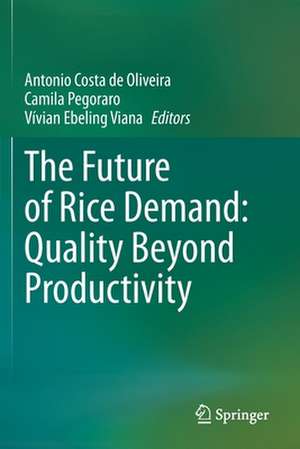The Future of Rice Demand: Quality Beyond Productivity
Editat de Antonio Costa de Oliveira, Camila Pegoraro, Vívian Ebeling Vianaen Limba Engleză Paperback – 27 mar 2021
The Future of Rice Demand: Quality Beyond Productivity offers researchers a better understanding of the nutritional aspects of rice. Omics technologies applied to cereal grain quality have been scarce in the literature published to date, making this text an excellent single source for researchers in regions where rice is a major crop. The first section of the book focuses on the major aspects of the industrial processing of all rice types. Further sections look at contamination prevention and biofortification, special rice types, and omics and other molecular tools used in the mass production and processing of healthy rice products.
| Toate formatele și edițiile | Preț | Express |
|---|---|---|
| Paperback (1) | 956.99 lei 6-8 săpt. | |
| Springer International Publishing – 27 mar 2021 | 956.99 lei 6-8 săpt. | |
| Hardback (1) | 963.29 lei 6-8 săpt. | |
| Springer International Publishing – 27 mar 2020 | 963.29 lei 6-8 săpt. |
Preț: 956.99 lei
Preț vechi: 1167.06 lei
-18% Nou
Puncte Express: 1435
Preț estimativ în valută:
183.13€ • 195.82$ • 152.68£
183.13€ • 195.82$ • 152.68£
Carte tipărită la comandă
Livrare economică 17 aprilie-01 mai
Preluare comenzi: 021 569.72.76
Specificații
ISBN-13: 9783030375126
ISBN-10: 3030375129
Ilustrații: XV, 544 p. 77 illus., 59 illus. in color.
Dimensiuni: 155 x 235 mm
Greutate: 0.78 kg
Ediția:1st ed. 2020
Editura: Springer International Publishing
Colecția Springer
Locul publicării:Cham, Switzerland
ISBN-10: 3030375129
Ilustrații: XV, 544 p. 77 illus., 59 illus. in color.
Dimensiuni: 155 x 235 mm
Greutate: 0.78 kg
Ediția:1st ed. 2020
Editura: Springer International Publishing
Colecția Springer
Locul publicării:Cham, Switzerland
Cuprins
Introduction
Industrial processing
White, brown and parboiled rice
Industrial quality
Uncontaminated food
Arsenic Lead
Biofortification
Golden rice
Iron biofortification
Zinc biofortification
Selenium biofortification
Special rice
Red/Black
Aromatic
Rice for special culinary
Omics genomic for quality
transcriptomic for quality
proteomic for quality
metabolomic for quality
Molecular tools
Molecular markers Mutation induction and detection
Genome editing
Transgenic
Future perspectives
Industrial processing
White, brown and parboiled rice
Industrial quality
Uncontaminated food
Arsenic Lead
Biofortification
Golden rice
Iron biofortification
Zinc biofortification
Selenium biofortification
Special rice
Red/Black
Aromatic
Rice for special culinary
Omics genomic for quality
transcriptomic for quality
proteomic for quality
metabolomic for quality
Molecular tools
Molecular markers Mutation induction and detection
Genome editing
Transgenic
Future perspectives
Notă biografică
Antonio Costa de Oliveira is a Professor in the Department of Plant Sciences at the The Federal University of Pelotas, Brazil campus
Camila Pegoraro is a Professor in the Department of Plant Sciences at the The Federal University of Pelotas, Brazil campus
Luciano Carlos da Maia is a Professor in the Department of Plant Sciences at the The Federal University of Pelotas, Brazil campus Vívian Ebeling Viana is a Professor in the Department of Plant Sciences at the The Federal University of Pelotas, Brazil campus
Camila Pegoraro is a Professor in the Department of Plant Sciences at the The Federal University of Pelotas, Brazil campus
Luciano Carlos da Maia is a Professor in the Department of Plant Sciences at the The Federal University of Pelotas, Brazil campus Vívian Ebeling Viana is a Professor in the Department of Plant Sciences at the The Federal University of Pelotas, Brazil campus
Textul de pe ultima copertă
This book aims to provide an overview of the challenges and available technologies to improve rice and provide a response to the challenge posed by increasing world population and the resultant food shortages. Nutritional aspects of rice products and omics and the molecular technologies currently being used are covered in depth. As a staple food for over 50% of the world´s population, an estimated 9 billion people will need to be fed by 2050, and healthy and uncontaminated foods need to reach consumers in developed and developing countries.This makes quality beyond productivity incredibly important and is one of the overriding themes of this work.
The Future of Rice Demand: Quality Beyond Productivity offers researchers a better understanding of the nutritional aspects of rice. Omics technologies applied to cereal grain quality have been scarce in the literature published to date, making this text an excellent single source for researchers in regions where rice is a major crop. The first section of the book focuses on the major aspects of the industrial processing of all rice types. Further sections look at contamination prevention and biofortification, special rice types, and omics and other molecular tools used in the mass production and processing of healthy rice products.
The Future of Rice Demand: Quality Beyond Productivity offers researchers a better understanding of the nutritional aspects of rice. Omics technologies applied to cereal grain quality have been scarce in the literature published to date, making this text an excellent single source for researchers in regions where rice is a major crop. The first section of the book focuses on the major aspects of the industrial processing of all rice types. Further sections look at contamination prevention and biofortification, special rice types, and omics and other molecular tools used in the mass production and processing of healthy rice products.
Caracteristici
Promotes a better understanding of the nutritional aspects of rice
Comprehensively cover omics technologies applied to cereal grain quality
Explores the molecular aspects of rice, providing an excellent tool for students and researchers in countries where rice is a major crop
Comprehensively cover omics technologies applied to cereal grain quality
Explores the molecular aspects of rice, providing an excellent tool for students and researchers in countries where rice is a major crop
